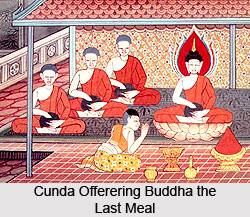 Cunda was the last person who offered Gautama Buddha his last meal. Mahaparinirbana Sutta states that Cunda was a silversmith. Other texts, however, state that he was a blacksmith. Buddha was staying near Pava in Cunda`s mango grove. While staying there Buddha preached to Cunda about the ways in which one can purify himself.
Cunda was the last person who offered Gautama Buddha his last meal. Mahaparinirbana Sutta states that Cunda was a silversmith. Other texts, however, state that he was a blacksmith. Buddha was staying near Pava in Cunda`s mango grove. While staying there Buddha preached to Cunda about the ways in which one can purify himself.
Cunda believed in the ways of the Brahmins. It was Buddha who broke his misconceptions and showed him the right paths to purify bodily action, mental action and verbal action. Detailed accounts of the teachings of Buddha are to be found in Maha-parinibbana Sutta. Through these teachings Buddha explained to Cunda the Eight fold Paths and how to break away from the shackles of rebirth.
In Buddhist history, however, Cunda is more widely known as a person who offered the last meal to Buddha and he fell sick. While some say that he offered pork to Buddha others say that it was mushroom. Cunda was filled with remorse at witnessing Buddha`s ill health. Gautama assured him and said that he was just a means through whom he can attain Parinirvana.
On receiving Buddha`s teachings Cunda expressed his desire to be remembered as one who had took refuge in the Triple Gems.









